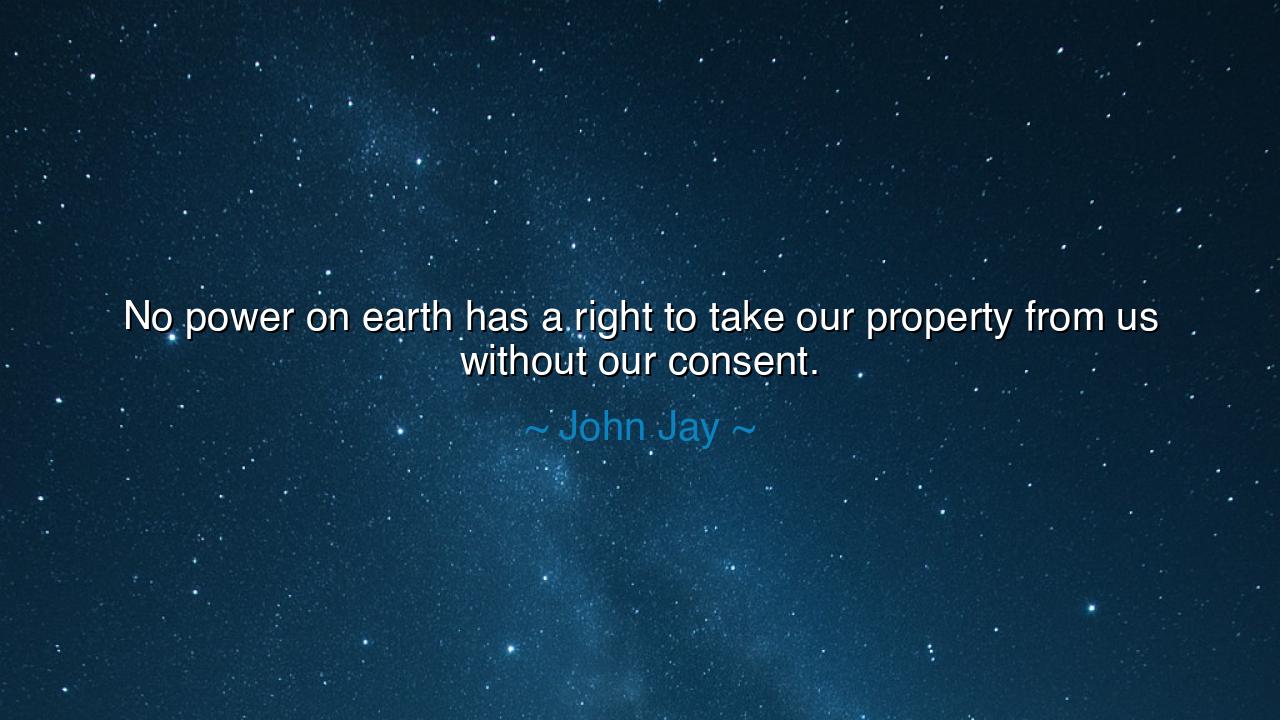
No power on earth has a right to take our property from us






The founding father John Jay, voice of justice and architect of a nation, thundered with clarity when he declared: “No power on earth has a right to take our property from us without our consent.” In this, he gave words to the eternal cry of free men and women: that liberty is not a gift from kings, but a birthright. Property is more than land or coin; it is the fruit of labor, the sweat of the brow, the very symbol of independence. To take it without consent is not taxation—it is tyranny, it is theft adorned in the robes of law.
The origin of this truth lies in the fiery struggle of the American colonies against imperial might. The people were burdened with taxes imposed by a distant crown, stripped of their voice in the making of laws. Against this injustice rose the cry of “No taxation without representation,” a cry that echoed through taverns, churches, and assemblies. John Jay, a man of pen and principle, proclaimed that no earthly power—be it monarch or parliament—could justly seize what the people had not freely yielded. Thus was laid one of the cornerstones of the American Revolution.
History offers us the tale of the Boston Tea Party, when men disguised as Mohawks cast the taxed tea into the sea. They were not enraged at the tea itself, but at the principle of compulsion, of tribute demanded without consent. Better to pour the riches into the harbor than to drink them under tyranny. Their defiance became a spark, igniting the fires of revolution that birthed a nation. Jay’s words capture the very soul of that act: that freedom is worth more than wealth, and dignity more than comfort.
The ancients themselves knew this truth. The Romans, when free, guarded their rights with vigilance, yet when emperors grew bold and seized both gold and liberty, their republic decayed into chains. A people that surrenders the right to their own property without question soon surrenders their voice, their strength, and at last, their very freedom. For the taking of goods is often the first step in the taking of souls.
Therefore, O children of the future, guard your consent as you would guard your life. Let no power—no crown, no assembly, no tyrant—strip from you the fruit of your labor without your voice. For the one who owns his work owns his destiny, but the one who is robbed of it becomes a slave. John Jay’s words are not relics of the past, but living fire: a reminder that freedom rests upon the sacred covenant between property and consent, and that to betray it is to betray liberty itself.






TGnguyen thi giau
I appreciate John Jay’s focus on consent and the protection of property rights, but does this principle apply equally to all forms of property? How do we address situations like climate change or the use of public resources, where collective ownership might conflict with individual property rights? Is there ever a case where it might be morally right to override individual consent for the greater good, and if so, how do we determine when that’s appropriate?
ANMai anh Nguyen
This quote makes me reflect on how much we value personal property, but also brings up questions about power and control. What happens when there are power imbalances—when the wealthy or corporations hold power over individuals? Is this idea still valid in the context of today’s complex legal and economic systems? How can we safeguard individual rights without allowing the powerful to exploit or infringe upon the rights of others?
NMNi My
John Jay’s statement on property rights resonates with the core principles of personal freedom, but I feel like there’s a tension between individual rights and the collective needs of society. In situations where public safety or national interest is at stake, should property rights still hold the same weight? How do we navigate conflicts where individual property owners are unwilling to give consent, even when it benefits the wider community?
ATVan anh Tran
This quote emphasizes the importance of consent in decisions regarding property rights, but I wonder how far it extends. What if the government is acting in the interest of the public, like in cases of urban development or environmental protection? How do we reconcile the protection of individual property rights with the needs of a growing society? Can this statement be applied universally, or do we need to allow some flexibility when it comes to the common good?
BCA B C
I agree with John Jay’s principle that property rights should be respected, but I’m curious—how do we ensure these rights are protected in practice, especially when power dynamics come into play? Could this idea be used to challenge unfair property laws or corporate exploitation? Does the concept of ‘consent’ really apply in every situation, or is there a deeper conversation about what constitutes true consent in terms of governance and law?